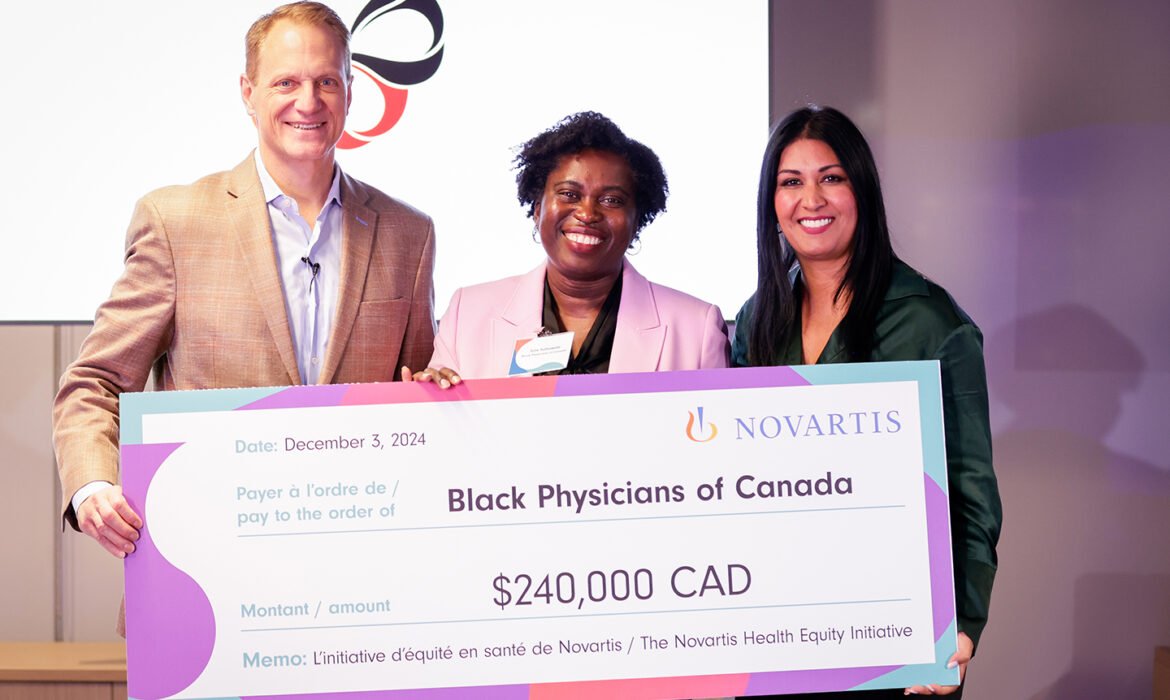On Dec. 3, 2024, the healthcare company Novartis Canada announced that the non-profit organization Black Physicians of Canada (BPC) won $240,000 for its health equity initiative. BPC will use the funds to improve health equity for Black communities in Canada.
BPC aims to build a community of Black physicians and physicians in training. Its goal is to empower these positions through mentorship and advice on advocacy, support, representation and more. BPC also wants to provide economic support to help fund research projects and initiatives.
BPC executive director Julie Sobowale said she is excited about the health equity initiative and expressed gratitude to Novartis for the opportunity.
“It’s going to help us move forward because we’re a young organization; we were founded in 2020. So this will take us to the next step, but also to help Black communities,” Sobowale said. “We applied for this initiative because we also want to strengthen access to culturally-sensitive care.”
Sobowale explained that the health equity project will create a public national database of Black physicians in Canada, which will help people find a Black physician in their area. They will also make a digital Black health hub. She added that because of anti-Black racism, many social determinants and disparities affect healthcare for Black populations.
“We [Black communities] have higher mortality rates because we’re not able to access the culturally sensitive healthcare that that we need,” Sobowale said. “There’s a disparity even in funding for Black health equity altogether. This is why Novartis’s creation of this initiative to fund us is significant; there aren’t a lot of opportunities for funding research.”
Sobowale said another issue is the lack of access to education, as attending medical school is expensive. BPC knows that having more Black physicians will help Black communities to access healthcare and improve patient care.
Sobowale expressed that BPC has positively impacted the Black community through its mentorship program.
“We also have a mentorship program because for a lot of Black physicians, they have this experience where they’re working somewhere or going through a program and they’re the only Black physician there, or they’re the only Black resident there,” Sobowale said.
She emphasized that people excelled in their residency programs as they went into practice due to the support they received through this program.
They also get advice on dealing with microaggressions at the workplace, financial management, and what it means to run a private practice once they finish their residency.
Sobowale said that Black physicians, medical students, and residents gather at their national conferences. These events help build a stronger community and celebrate their work and achievements.
“You’ll understand the power of bringing people together in person to build community is so significant. I think those things will uplift us and give us the energy to keep this fight going,” Sobowale said.
Sobowale believes there is more awareness of Black health equity, partly because Black communities were more affected by COVID-19 than others.
She added that the information about the health equity project will be available in English and French so that everyone can access it.
“We understand that the issues in Montreal will be slightly different from those in Toronto. That’s why we’re excited about this project; it’s on a foundational level,” Sobowale said.
Shari Fraser is the patient advocacy lead at Novartis. She explained that they created the health equity initiative in collaboration with Equity Mobilizing Partnerships in Community (EMPACT), an award-winning model of equity that promotes patient engagement out of Women’s College Hospital (WCH).
She explained that the top three initiatives received over $680,000 in funding.
Fraser said they wanted to use the health equity initiative to reach as many grassroots community and non-profit organizations as possible.
“We recognize that even with a publicly funded healthcare system, there are a lot of inequities that still exist,” Fraser said. “Our role as corporate citizens is to try to support community and non-profit organizations that are on the ground working with communities to help move things forward when it comes to health equity in Canada. It’s a small part in the big puzzle, But we all have our role to play.”














